Exploring Psychological and Sociological Approaches to Religion
VerifiedAdded on 2023/05/26
|7
|1329
|105
Essay
AI Summary
This essay provides a comprehensive overview of various approaches to the study of religion, focusing primarily on psychological, sociological, functionalist, and conflict perspectives. It begins by examining the psychological approach, highlighting Sigmund Freud's psychoanalytic theories that view religion as a form of neurosis rooted in unconscious fears. Next, it delves into the sociological approach, emphasizing the works of Émile Durkheim, Karl Marx, and Max Weber, who explored the relationship between religion and social structures. The essay then discusses the functionalist perspective, which analyzes the role of religion in fulfilling individual needs, promoting social cohesion, providing a worldview, and facilitating adaptation to society. Finally, the conflict approach is explored, contrasting it with the functionalist view by presenting religion as a source of social conflict and a tool used by the ruling class to maintain control. The essay concludes by highlighting the contrasting nature of these approaches and their respective contributions to understanding religion in different ways. Desklib offers a platform for students to access this essay and similar resources for their studies.
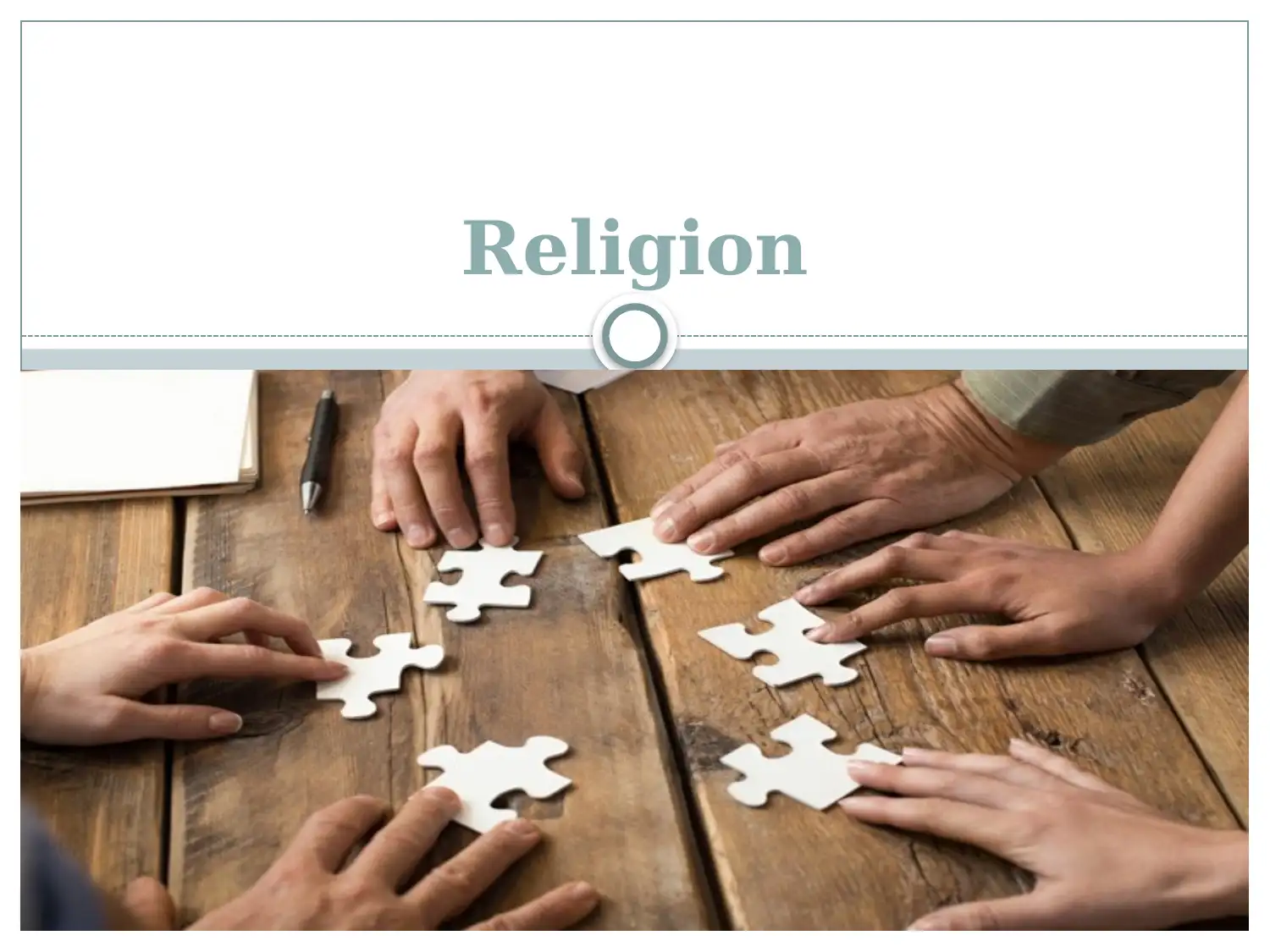
Religion
Paraphrase This Document
Need a fresh take? Get an instant paraphrase of this document with our AI Paraphraser
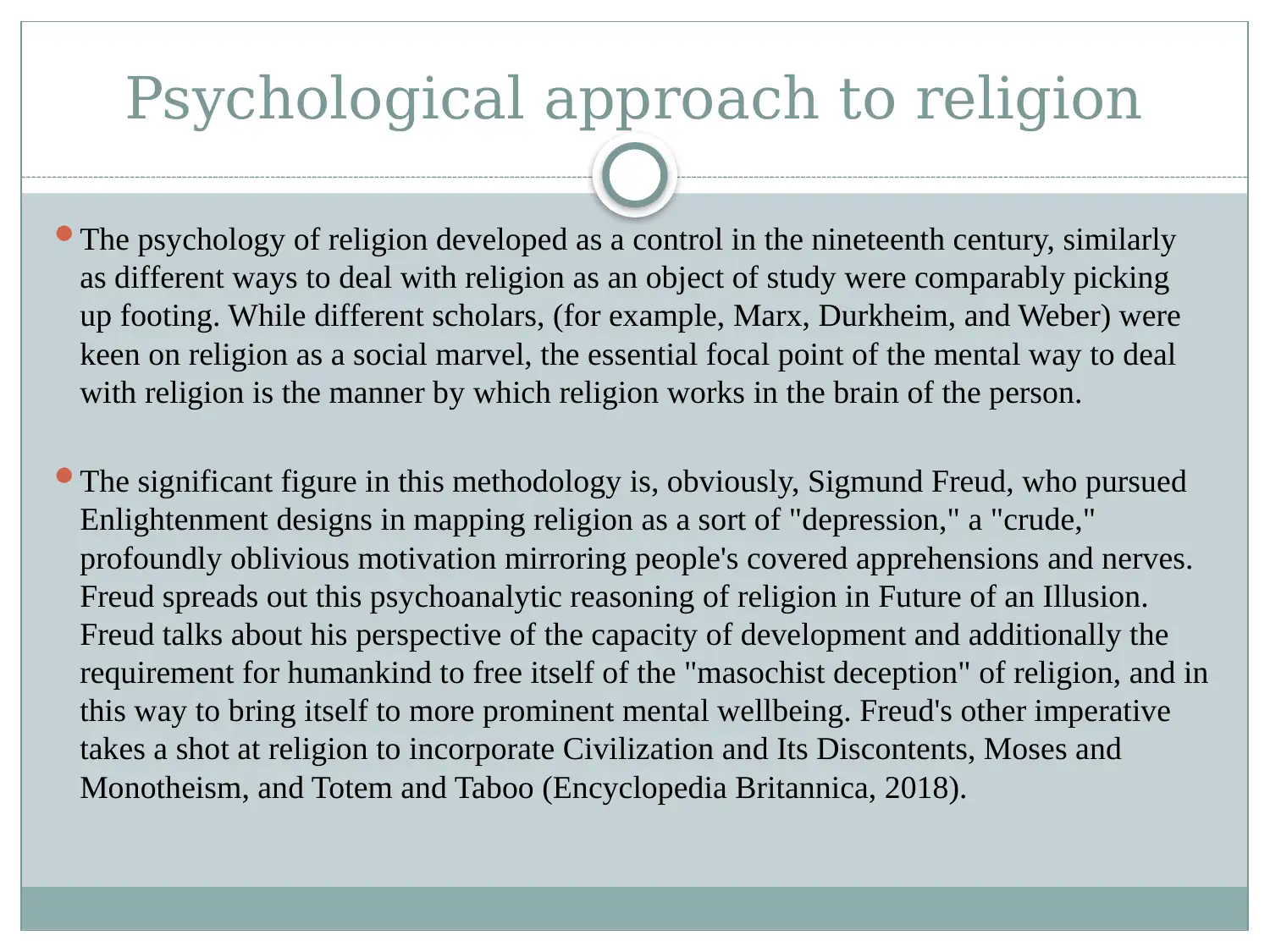
Psychological approach to religion
The psychology of religion developed as a control in the nineteenth century, similarly
as different ways to deal with religion as an object of study were comparably picking
up footing. While different scholars, (for example, Marx, Durkheim, and Weber) were
keen on religion as a social marvel, the essential focal point of the mental way to deal
with religion is the manner by which religion works in the brain of the person.
The significant figure in this methodology is, obviously, Sigmund Freud, who pursued
Enlightenment designs in mapping religion as a sort of "depression," a "crude,"
profoundly oblivious motivation mirroring people's covered apprehensions and nerves.
Freud spreads out this psychoanalytic reasoning of religion in Future of an Illusion.
Freud talks about his perspective of the capacity of development and additionally the
requirement for humankind to free itself of the "masochist deception" of religion, and in
this way to bring itself to more prominent mental wellbeing. Freud's other imperative
takes a shot at religion to incorporate Civilization and Its Discontents, Moses and
Monotheism, and Totem and Taboo (Encyclopedia Britannica, 2018).
The psychology of religion developed as a control in the nineteenth century, similarly
as different ways to deal with religion as an object of study were comparably picking
up footing. While different scholars, (for example, Marx, Durkheim, and Weber) were
keen on religion as a social marvel, the essential focal point of the mental way to deal
with religion is the manner by which religion works in the brain of the person.
The significant figure in this methodology is, obviously, Sigmund Freud, who pursued
Enlightenment designs in mapping religion as a sort of "depression," a "crude,"
profoundly oblivious motivation mirroring people's covered apprehensions and nerves.
Freud spreads out this psychoanalytic reasoning of religion in Future of an Illusion.
Freud talks about his perspective of the capacity of development and additionally the
requirement for humankind to free itself of the "masochist deception" of religion, and in
this way to bring itself to more prominent mental wellbeing. Freud's other imperative
takes a shot at religion to incorporate Civilization and Its Discontents, Moses and
Monotheism, and Totem and Taboo (Encyclopedia Britannica, 2018).
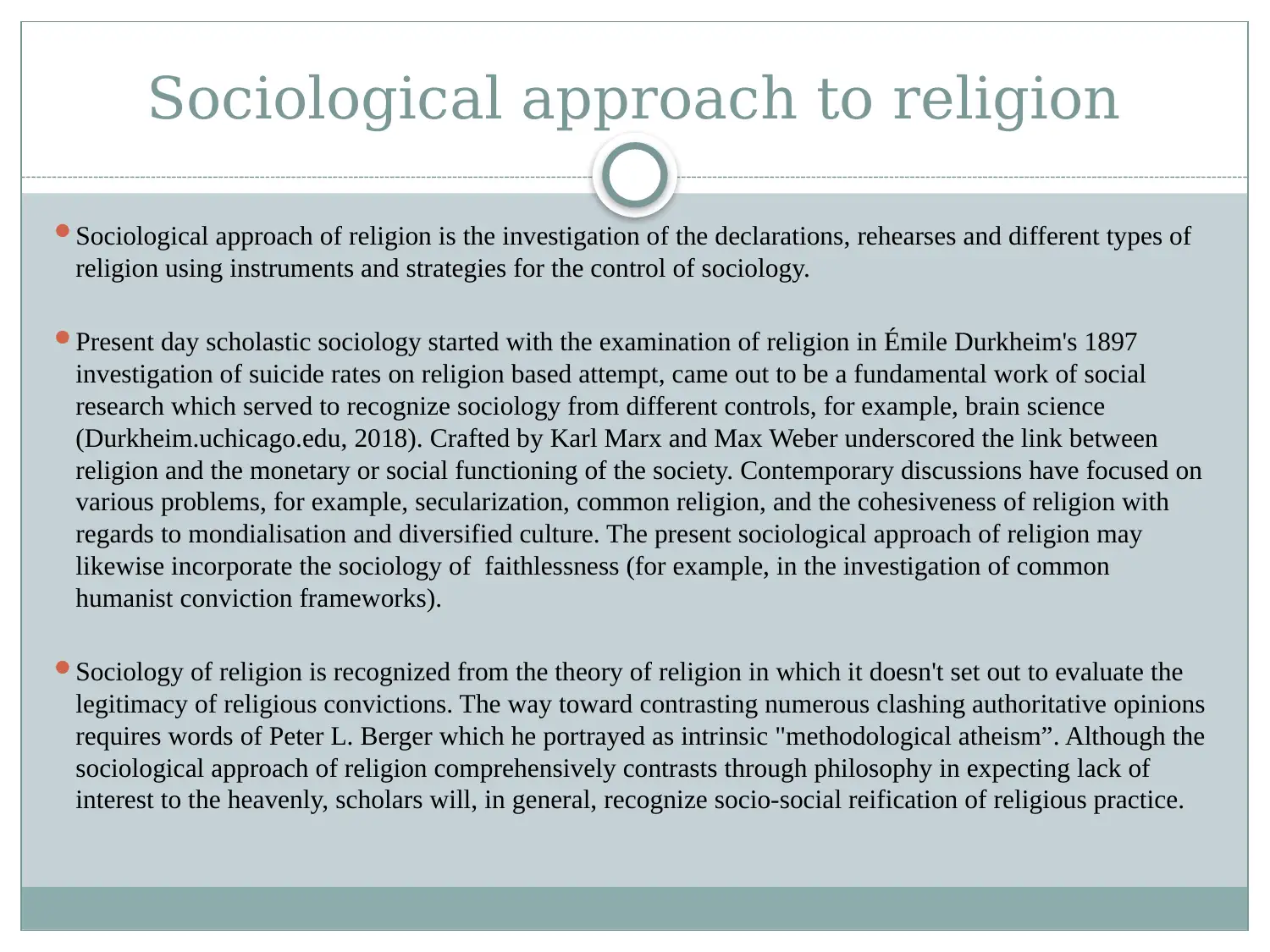
Sociological approach to religion
Sociological approach of religion is the investigation of the declarations, rehearses and different types of
religion using instruments and strategies for the control of sociology.
Present day scholastic sociology started with the examination of religion in Émile Durkheim's 1897
investigation of suicide rates on religion based attempt, came out to be a fundamental work of social
research which served to recognize sociology from different controls, for example, brain science
(Durkheim.uchicago.edu, 2018). Crafted by Karl Marx and Max Weber underscored the link between
religion and the monetary or social functioning of the society. Contemporary discussions have focused on
various problems, for example, secularization, common religion, and the cohesiveness of religion with
regards to mondialisation and diversified culture. The present sociological approach of religion may
likewise incorporate the sociology of faithlessness (for example, in the investigation of common
humanist conviction frameworks).
Sociology of religion is recognized from the theory of religion in which it doesn't set out to evaluate the
legitimacy of religious convictions. The way toward contrasting numerous clashing authoritative opinions
requires words of Peter L. Berger which he portrayed as intrinsic "methodological atheism”. Although the
sociological approach of religion comprehensively contrasts through philosophy in expecting lack of
interest to the heavenly, scholars will, in general, recognize socio-social reification of religious practice.
Sociological approach of religion is the investigation of the declarations, rehearses and different types of
religion using instruments and strategies for the control of sociology.
Present day scholastic sociology started with the examination of religion in Émile Durkheim's 1897
investigation of suicide rates on religion based attempt, came out to be a fundamental work of social
research which served to recognize sociology from different controls, for example, brain science
(Durkheim.uchicago.edu, 2018). Crafted by Karl Marx and Max Weber underscored the link between
religion and the monetary or social functioning of the society. Contemporary discussions have focused on
various problems, for example, secularization, common religion, and the cohesiveness of religion with
regards to mondialisation and diversified culture. The present sociological approach of religion may
likewise incorporate the sociology of faithlessness (for example, in the investigation of common
humanist conviction frameworks).
Sociology of religion is recognized from the theory of religion in which it doesn't set out to evaluate the
legitimacy of religious convictions. The way toward contrasting numerous clashing authoritative opinions
requires words of Peter L. Berger which he portrayed as intrinsic "methodological atheism”. Although the
sociological approach of religion comprehensively contrasts through philosophy in expecting lack of
interest to the heavenly, scholars will, in general, recognize socio-social reification of religious practice.
⊘ This is a preview!⊘
Do you want full access?
Subscribe today to unlock all pages.

Trusted by 1+ million students worldwide
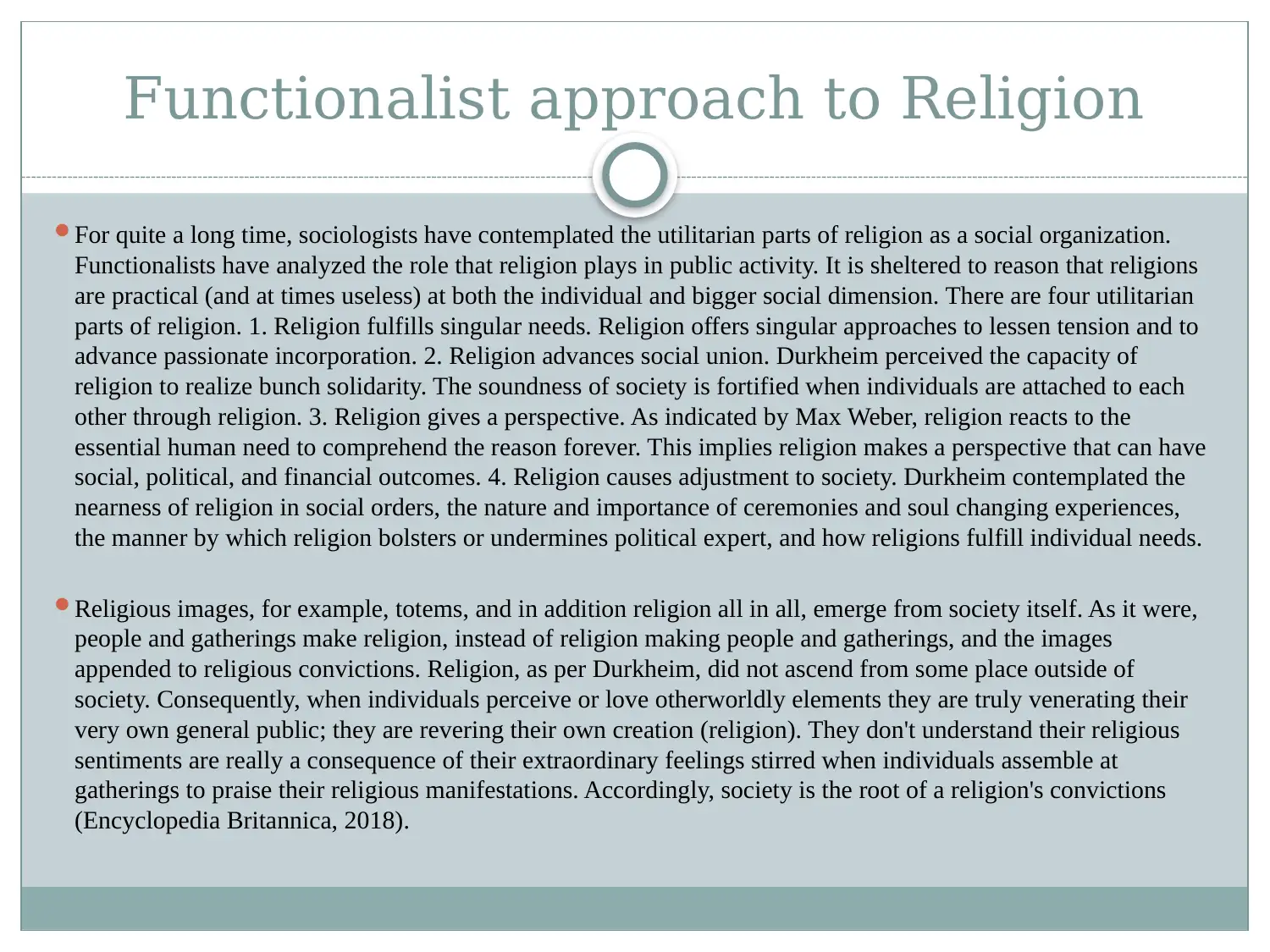
Functionalist approach to Religion
For quite a long time, sociologists have contemplated the utilitarian parts of religion as a social organization.
Functionalists have analyzed the role that religion plays in public activity. It is sheltered to reason that religions
are practical (and at times useless) at both the individual and bigger social dimension. There are four utilitarian
parts of religion. 1. Religion fulfills singular needs. Religion offers singular approaches to lessen tension and to
advance passionate incorporation. 2. Religion advances social union. Durkheim perceived the capacity of
religion to realize bunch solidarity. The soundness of society is fortified when individuals are attached to each
other through religion. 3. Religion gives a perspective. As indicated by Max Weber, religion reacts to the
essential human need to comprehend the reason forever. This implies religion makes a perspective that can have
social, political, and financial outcomes. 4. Religion causes adjustment to society. Durkheim contemplated the
nearness of religion in social orders, the nature and importance of ceremonies and soul changing experiences,
the manner by which religion bolsters or undermines political expert, and how religions fulfill individual needs.
Religious images, for example, totems, and in addition religion all in all, emerge from society itself. As it were,
people and gatherings make religion, instead of religion making people and gatherings, and the images
appended to religious convictions. Religion, as per Durkheim, did not ascend from some place outside of
society. Consequently, when individuals perceive or love otherworldly elements they are truly venerating their
very own general public; they are revering their own creation (religion). They don't understand their religious
sentiments are really a consequence of their extraordinary feelings stirred when individuals assemble at
gatherings to praise their religious manifestations. Accordingly, society is the root of a religion's convictions
(Encyclopedia Britannica, 2018).
For quite a long time, sociologists have contemplated the utilitarian parts of religion as a social organization.
Functionalists have analyzed the role that religion plays in public activity. It is sheltered to reason that religions
are practical (and at times useless) at both the individual and bigger social dimension. There are four utilitarian
parts of religion. 1. Religion fulfills singular needs. Religion offers singular approaches to lessen tension and to
advance passionate incorporation. 2. Religion advances social union. Durkheim perceived the capacity of
religion to realize bunch solidarity. The soundness of society is fortified when individuals are attached to each
other through religion. 3. Religion gives a perspective. As indicated by Max Weber, religion reacts to the
essential human need to comprehend the reason forever. This implies religion makes a perspective that can have
social, political, and financial outcomes. 4. Religion causes adjustment to society. Durkheim contemplated the
nearness of religion in social orders, the nature and importance of ceremonies and soul changing experiences,
the manner by which religion bolsters or undermines political expert, and how religions fulfill individual needs.
Religious images, for example, totems, and in addition religion all in all, emerge from society itself. As it were,
people and gatherings make religion, instead of religion making people and gatherings, and the images
appended to religious convictions. Religion, as per Durkheim, did not ascend from some place outside of
society. Consequently, when individuals perceive or love otherworldly elements they are truly venerating their
very own general public; they are revering their own creation (religion). They don't understand their religious
sentiments are really a consequence of their extraordinary feelings stirred when individuals assemble at
gatherings to praise their religious manifestations. Accordingly, society is the root of a religion's convictions
(Encyclopedia Britannica, 2018).
Paraphrase This Document
Need a fresh take? Get an instant paraphrase of this document with our AI Paraphraser
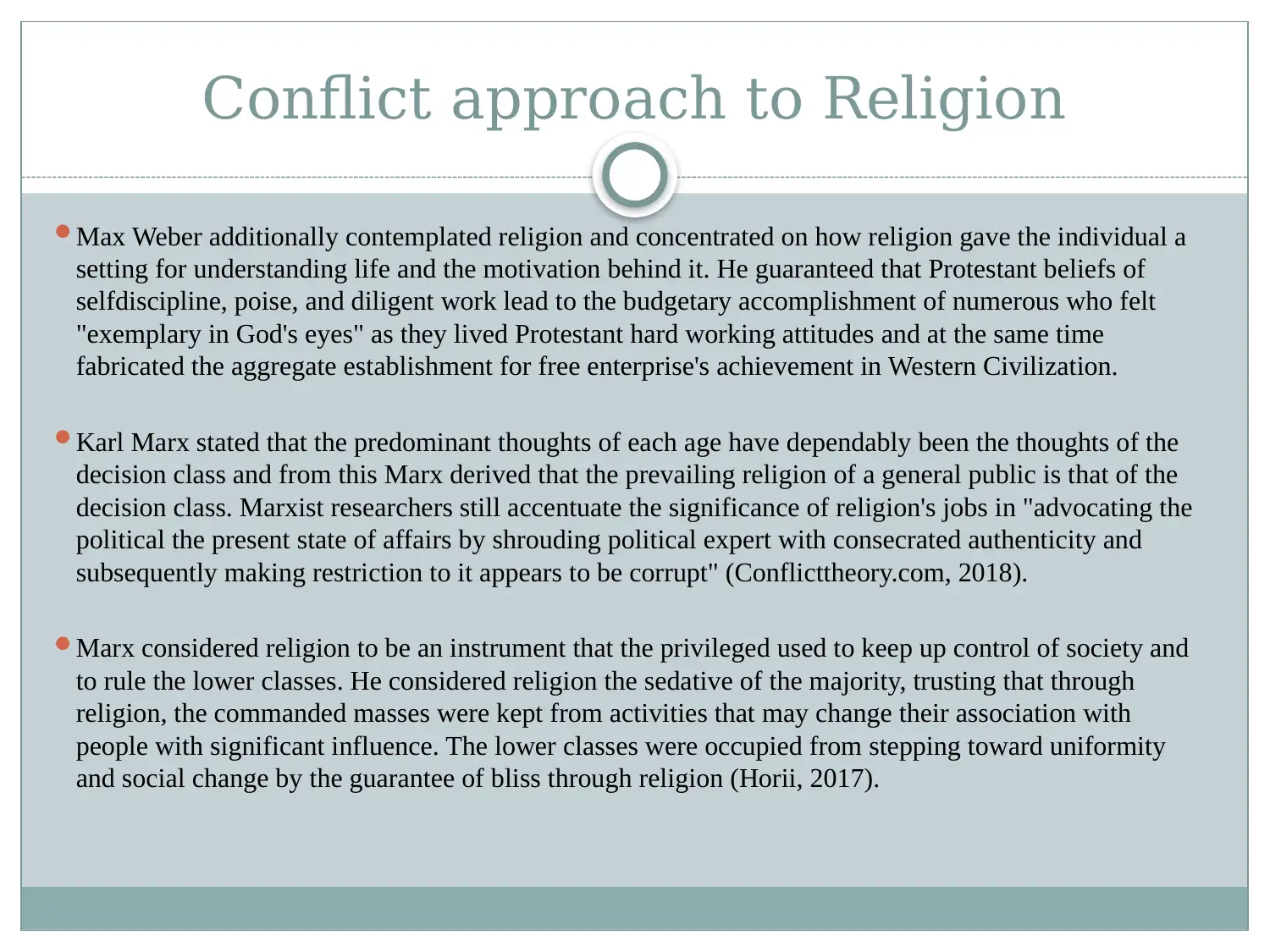
Conflict approach to Religion
Max Weber additionally contemplated religion and concentrated on how religion gave the individual a
setting for understanding life and the motivation behind it. He guaranteed that Protestant beliefs of
selfdiscipline, poise, and diligent work lead to the budgetary accomplishment of numerous who felt
"exemplary in God's eyes" as they lived Protestant hard working attitudes and at the same time
fabricated the aggregate establishment for free enterprise's achievement in Western Civilization.
Karl Marx stated that the predominant thoughts of each age have dependably been the thoughts of the
decision class and from this Marx derived that the prevailing religion of a general public is that of the
decision class. Marxist researchers still accentuate the significance of religion's jobs in "advocating the
political the present state of affairs by shrouding political expert with consecrated authenticity and
subsequently making restriction to it appears to be corrupt" (Conflicttheory.com, 2018).
Marx considered religion to be an instrument that the privileged used to keep up control of society and
to rule the lower classes. He considered religion the sedative of the majority, trusting that through
religion, the commanded masses were kept from activities that may change their association with
people with significant influence. The lower classes were occupied from stepping toward uniformity
and social change by the guarantee of bliss through religion (Horii, 2017).
Max Weber additionally contemplated religion and concentrated on how religion gave the individual a
setting for understanding life and the motivation behind it. He guaranteed that Protestant beliefs of
selfdiscipline, poise, and diligent work lead to the budgetary accomplishment of numerous who felt
"exemplary in God's eyes" as they lived Protestant hard working attitudes and at the same time
fabricated the aggregate establishment for free enterprise's achievement in Western Civilization.
Karl Marx stated that the predominant thoughts of each age have dependably been the thoughts of the
decision class and from this Marx derived that the prevailing religion of a general public is that of the
decision class. Marxist researchers still accentuate the significance of religion's jobs in "advocating the
political the present state of affairs by shrouding political expert with consecrated authenticity and
subsequently making restriction to it appears to be corrupt" (Conflicttheory.com, 2018).
Marx considered religion to be an instrument that the privileged used to keep up control of society and
to rule the lower classes. He considered religion the sedative of the majority, trusting that through
religion, the commanded masses were kept from activities that may change their association with
people with significant influence. The lower classes were occupied from stepping toward uniformity
and social change by the guarantee of bliss through religion (Horii, 2017).
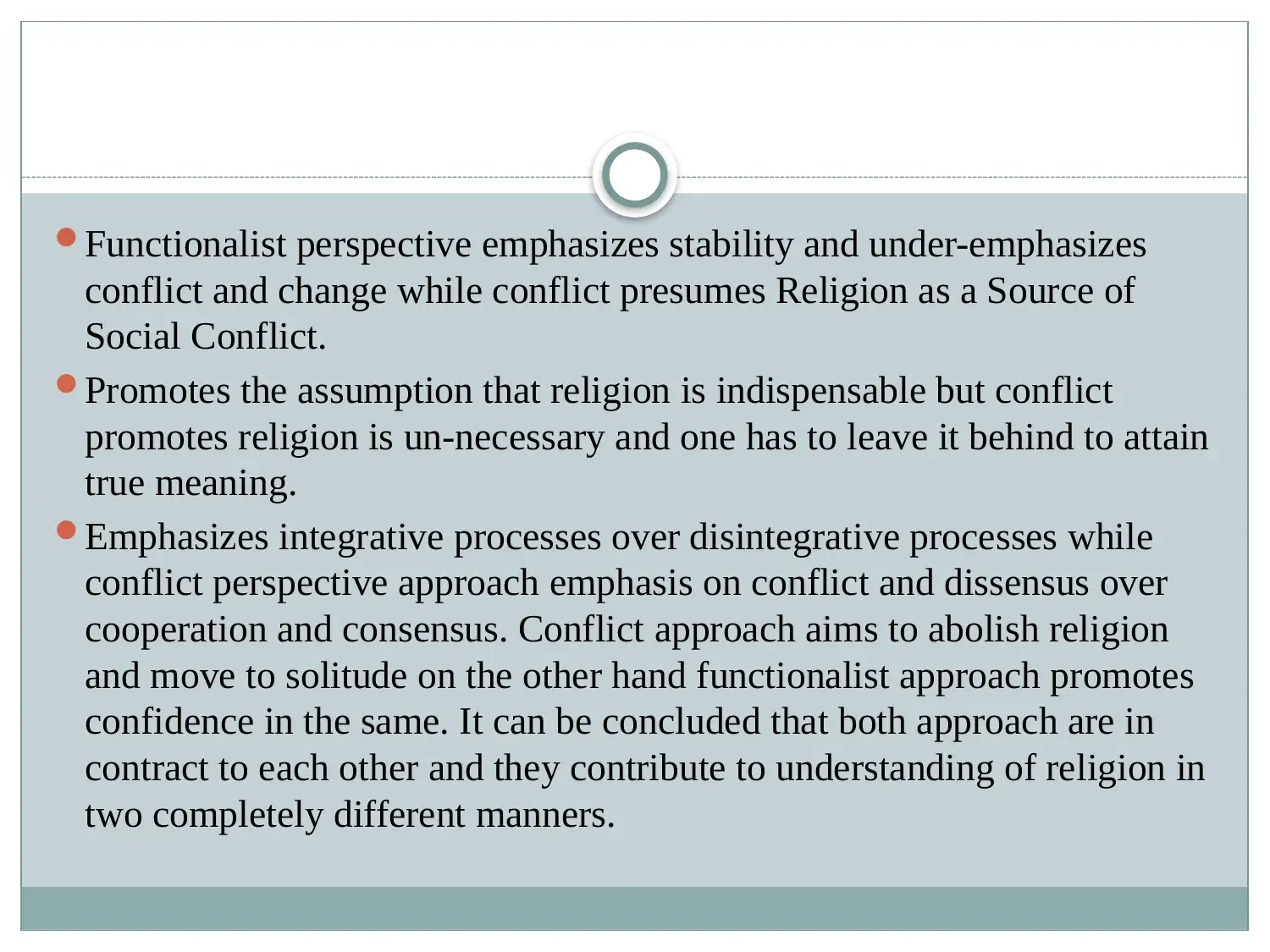
Functionalist perspective emphasizes stability and under-emphasizes
conflict and change while conflict presumes Religion as a Source of
Social Conflict.
Promotes the assumption that religion is indispensable but conflict
promotes religion is un-necessary and one has to leave it behind to attain
true meaning.
Emphasizes integrative processes over disintegrative processes while
conflict perspective approach emphasis on conflict and dissensus over
cooperation and consensus. Conflict approach aims to abolish religion
and move to solitude on the other hand functionalist approach promotes
confidence in the same. It can be concluded that both approach are in
contract to each other and they contribute to understanding of religion in
two completely different manners.
conflict and change while conflict presumes Religion as a Source of
Social Conflict.
Promotes the assumption that religion is indispensable but conflict
promotes religion is un-necessary and one has to leave it behind to attain
true meaning.
Emphasizes integrative processes over disintegrative processes while
conflict perspective approach emphasis on conflict and dissensus over
cooperation and consensus. Conflict approach aims to abolish religion
and move to solitude on the other hand functionalist approach promotes
confidence in the same. It can be concluded that both approach are in
contract to each other and they contribute to understanding of religion in
two completely different manners.
⊘ This is a preview!⊘
Do you want full access?
Subscribe today to unlock all pages.

Trusted by 1+ million students worldwide
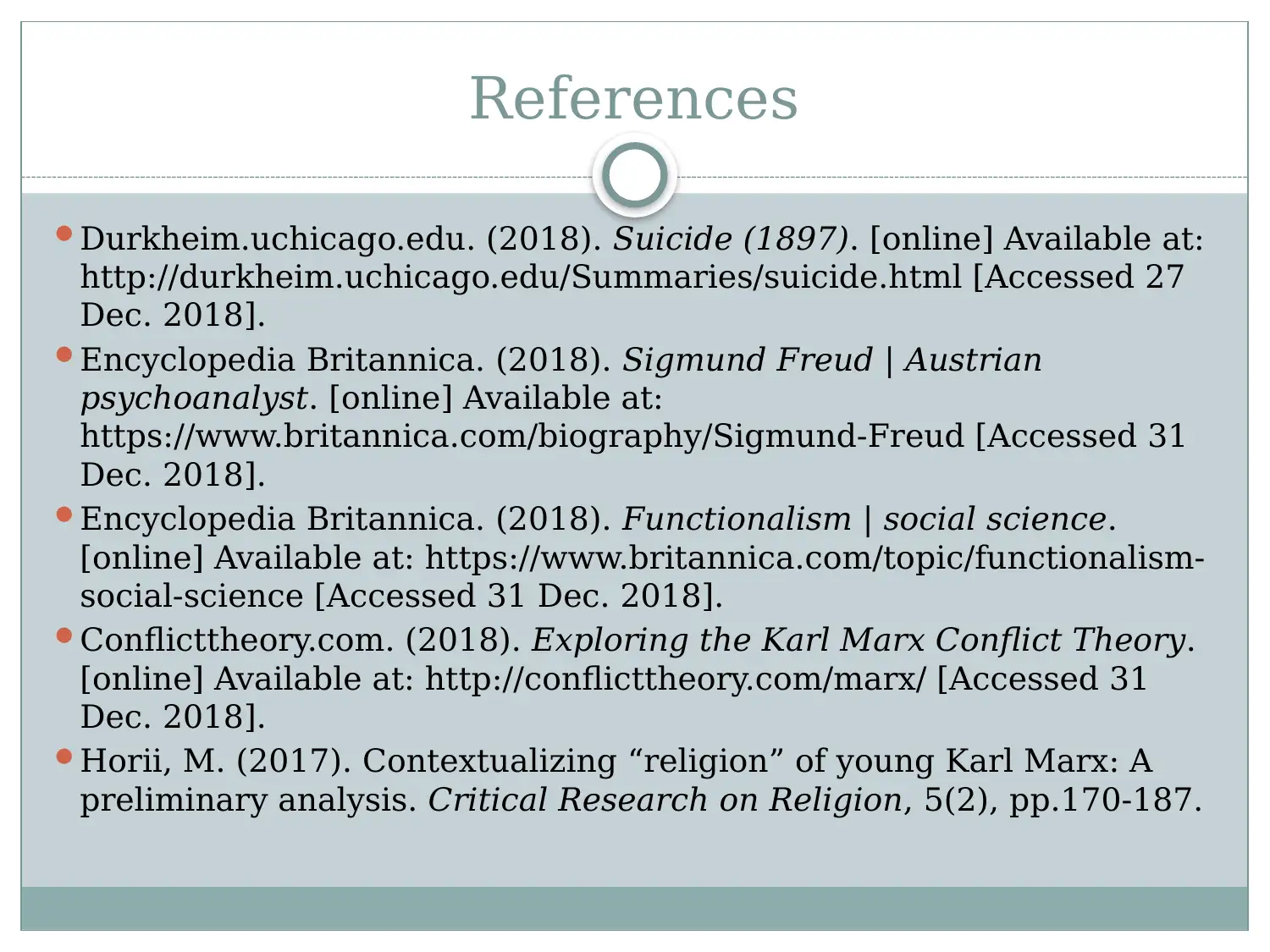
References
Durkheim.uchicago.edu. (2018). Suicide (1897). [online] Available at:
http://durkheim.uchicago.edu/Summaries/suicide.html [Accessed 27
Dec. 2018].
Encyclopedia Britannica. (2018). Sigmund Freud | Austrian
psychoanalyst. [online] Available at:
https://www.britannica.com/biography/Sigmund-Freud [Accessed 31
Dec. 2018].
Encyclopedia Britannica. (2018). Functionalism | social science.
[online] Available at: https://www.britannica.com/topic/functionalism-
social-science [Accessed 31 Dec. 2018].
Conflicttheory.com. (2018). Exploring the Karl Marx Conflict Theory.
[online] Available at: http://conflicttheory.com/marx/ [Accessed 31
Dec. 2018].
Horii, M. (2017). Contextualizing “religion” of young Karl Marx: A
preliminary analysis. Critical Research on Religion, 5(2), pp.170-187.
Durkheim.uchicago.edu. (2018). Suicide (1897). [online] Available at:
http://durkheim.uchicago.edu/Summaries/suicide.html [Accessed 27
Dec. 2018].
Encyclopedia Britannica. (2018). Sigmund Freud | Austrian
psychoanalyst. [online] Available at:
https://www.britannica.com/biography/Sigmund-Freud [Accessed 31
Dec. 2018].
Encyclopedia Britannica. (2018). Functionalism | social science.
[online] Available at: https://www.britannica.com/topic/functionalism-
social-science [Accessed 31 Dec. 2018].
Conflicttheory.com. (2018). Exploring the Karl Marx Conflict Theory.
[online] Available at: http://conflicttheory.com/marx/ [Accessed 31
Dec. 2018].
Horii, M. (2017). Contextualizing “religion” of young Karl Marx: A
preliminary analysis. Critical Research on Religion, 5(2), pp.170-187.
1 out of 7
Your All-in-One AI-Powered Toolkit for Academic Success.
+13062052269
info@desklib.com
Available 24*7 on WhatsApp / Email
![[object Object]](/_next/static/media/star-bottom.7253800d.svg)
Unlock your academic potential
Copyright © 2020–2026 A2Z Services. All Rights Reserved. Developed and managed by ZUCOL.